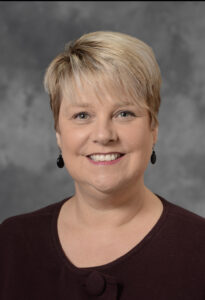

The MHA released another episode of the MiCare Champion Cast, which features interviews with healthcare policy experts in Michigan on key issues that impact healthcare and the health of communities.
On episode 31, MHA CEO Brian Peters and Kim Meeker, RN, BSN, MBA, president of the Michigan Organization for Nursing Leadership (MONL), discuss a recent package of bills introduced in the Michigan Legislature that could severely harm hospitals and access to patient care, if passed.
Senate Bills 334 – 336 and House Bills 4550 – 4552 propose a one-size-fits-all nurse ratio staffing mandate. In a recent joint statement, the MHA and MONL noted how this approach would limit the number of patients receiving hospital care at any one time and services hospitals can offer to their communities, prolong the time it takes for a patient to receive care and hinder many hospital’s ability to respond to a crisis in fear of violating Michigan law.
Throughout the episode, Peters and Meeker explain exactly what this could look like for Michigan nurses and patients while addressing false claims that the bills will help nursing shortages in Michigan – noting more effective solutions, including:
- Michigan joining the national Nurse Licensure Compact to reduce barriers for out-of-state nurses to move to and practice in Michigan immediately.
- Increasing eligibility for Michigan Reconnect by lowering the age requirement to 18 and older.
- Expanding Michigan Reconnect availability to include 4-year institutions.
- Increasing penalties for violence committed against healthcare workers.
The episode is available to steam on Spotify, YouTube, Apple Podcasts and SoundCloud. Those interested in learning more or connecting with local lawmakers on this issue are encouraged to visit the MHA’s Legislative Action Center.
Note: Each interview in this episode was recorded prior to the passing of the legislative fiscal year 2024 state budget. To see MHA CEO Brian Peters statement on new healthcare funding, visit the MHA Newsroom. Additional resources mentioned include the MHA Keystone Center and Duke Center for Healthcare Safety and Quality WellB program and the MI Hospital Careers webpage.
The MiCare Champion Cast is part of the statewide #MiCareMatters campaign, launched in 2017, which aims to build a network of citizens — “MiCare Champions” — who will be called upon to engage in advocacy efforts to protect access to affordable healthcare services in Michigan. Members with questions or who would like to submit ideas for future podcasts should contact Lucy Ciaramitaro at the MHA.



